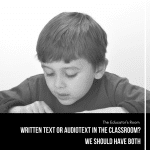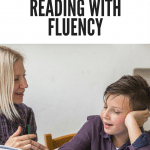“Since it is a sunny day today, I infer we’ll have recess.” My mouth dropped open in shock. Did this seven year old, first generation Latina really use the word “infer?” It was odd sounding, to be sure, but there it was. I laughed with delight and said we most certainly would have recess. She had inferred correctly.
“Reading is thinking” was the mantra in my classroom. Thinking about what the text shows but doesn’t tell is inference. Teaching inference seems overwhelming at first. It is one of the skills strong readers use without much thought. Beginning and struggling readers have to be reminded and taught to use it until it becomes second nature. In some ways it is similar to teaching estimation in math. You take what you know, add what you’ve just learned, then you can make an inference. You make a reasonable guess as to the meaning of the text.
Inference is a skill that goes beyond reading. An eighteen month old child infers when Mommy has a coat on and car keys in her hand that she is going somewhere. It is inferring when you hear the teacher use her “I mean it” voice with a steely look that you better stop goofing around. It is seeing the class next door, leaving the building at 9:15 with a bunch of parents that you can infer they are going on a field trip. It is using the clues given in a text to infer what an author wants to tell you.
I would begin with a mentor text, modeling and practicing with the whole class. We practiced some more in small groups. We practiced it in the hall. Then the children practiced it on their own. We spent an entire month on it. We used picture clues as well as text.
I described the act of inference as being a reading detective. For picture clues, I often used “Just a Dream” by Chris Van Allsburg as a mentor text. The story is about a boy who dreams of the future only to discover how polluted our world has become. It has a page of simple text followed by a double page illustration with no words. I explained that I wanted the class to infer what they would see, smell, taste, feel, or hear for each picture. After I read the book, I divided the class into pairs. Each pair received a copy of a picture from the book to discuss what they inferred about the picture. After they finished, I reread the book and each pair told their inferences when I came to their assigned picture.
To teach text inferences, each student had a stack of several sticky notes. While listening to the story, they would write down things they realized or inferred. For example, in “When I was Young in the Mountains” by Cynthia Rylant, as student might hear the sentence: Grandfather came home in the evening covered with the black dust of the coal mine. Students might write “Her grandpa had a dirty job.” Or “Her grandpa worked in the coal mine.” After listening to the story, the students shared their notes on the board. This gave me the opportunity to see who got it and who didn’t. We would then practice the same activity in guided reading groups with texts at their reading levels.
I used similar techniques to have children infer emotion in a story. We had a chart of emotions and character traits in the front of the room that we had created earlier in the year. If we read that a character gnashed his teeth or hid under her coat at recess, we gnashed our teeth or pretended to hide under a coat. Then we listed how the character might be feeling.
We also would practice inferring while we walked down the hall or waited for someone. I would say, “Look at the bulletin board outside Room 202’s classroom. What can you infer?” The class eagerly made guesses about what was going on in that classroom.
While teaching inference seems like a difficult concept to teach readers I found that practice, discussion, educated guesses, and more practice will supported my readers into making reasonable inferences in their reading.




